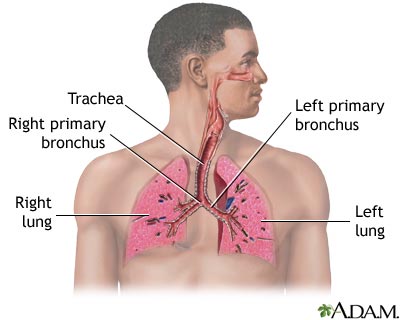Treatment
The main form of treatment for all forms of mountain sickness is to climb down (descend) to a lower altitude as rapidly and safely as possible. Extra oxygen should be given, if available.

People with severe mountain sickness may be admitted to a hospital.
Acetazolamide (Diamox) is a drug used to stimulate breathing and reduce mild symptoms of mountain sickness. This drug can cause increased urination. When taking this medication, make sure you drink plenty of fluids and do not drink alcohol.
Pulmonary edema, the build-up of fluid in the lungs, is treated with oxygen, the high blood pressure medicine nifedipine or phosphodiesterase inhibitors (sildenafil), and, in severe cases, a breathing machine (respirator).
The steroid drug dexamethasone (Decadron) may help reduce swelling in the brain (cerebral edema).
Portable hyperbaric chambers have been developed to allow hikers to simulate their conditions at lower altitudes without moving from their location on the mountain. These new devices are very important if bad weather or other factors make climbing down the mountain impossible.
Prognosis (Expectations)
Most cases are mild, and symptoms improve promptly with a return to lower altitude. Severe cases may result in death due to respiratory distress or brain swelling (cerebral edema).
In remote locations, emergency evacuation may not be possible, or treatment may be delayed. These conditions could adversely affect the outcome.
Complications
* Coma
* High altitude cerebral edema (brain swelling)
* Pulmonary edema
Calling Your Health Care Provider
Call your health care provider if you have or had symptoms of acute mountain sickness, even if you felt better when you returned to a lower altitude.
Call 911 or your local emergency number, or seek emergency medical assistance if severe difficulty breathing develops, or if you notice a lower level of consciousness, coughing up of blood, or other severe symptoms. If unable to contact emergency help, descend immediately, as rapidly as is safely possible.
Acute mountain sickness: Overview, Causes
Acute mountain sickness: Symptoms & Signs, Diagnosis & Tests
Acute mountain sickness: Treatment
Reviewed By : Jacob L. Heller, MD, Emergency Medicine, Virginia Mason Medical Center, Seattle, Washington, Clinic. Also reviewed by David Zieve, MD, MHA, Medical Director, A.D.A.M., Inc.
